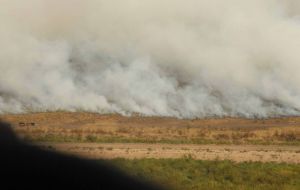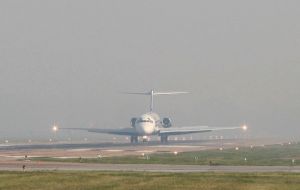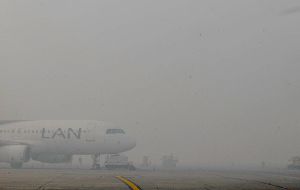MercoPress. South Atlantic News Agency
Choking Buenos Aires with no relief unless weather changes
 The fire has also fuelled another conflict between farmers and the government
The fire has also fuelled another conflict between farmers and the government  Bs. Aires Aeroparque airport close almost all day
Bs. Aires Aeroparque airport close almost all day  At the main International airport Ezeiza also several flights were delay
At the main International airport Ezeiza also several flights were delay With no forecasts of change, smoke blanketing Buenos Aires and extending to neighboring Uruguay has thickened forcing local authorities to close airports, major highways and declare a yellow alert in many hospitals.
The smoke started a week ago, caused by fires on grassland 300 kilometers to the north of Buenos Aires which winds have been extending south and eastwards. The government has blamed farmers clearing the land to graze cattle and announced it will prosecute anyone found responsible for lighting the fires. The government also posted in internet the list of farm owners of the land where smoke is originating causing city dwellers to complain of sore throats and eyes. Buenos Aires looked most of the day misty dark and many people begun using masks to protect themselves from smoke and smell of burnt grassland. Domestic airports, ports and several major roads were closed as visibility declined in some areas, to just a few meters. President Cristina Fernandez de Kirchner who usually travels on helicopter from her residence to Government House had to cancel the flight. Fire-fighters are battling to control the flames that have spread over an estimated 70.000 hectares of grassland which is suffering from an intense drought, providing ample fuel for the fires. However officials admit that unless climate conditions change drastically there's not much more that can be done. Hospitals are reporting increasing complaints of respiratory problems and sore eyes, and some shops have run out of dust masks. Residents are being advised to stay indoors and keep windows closed but the smell of burning has filled houses and offices. The fire has also fuelled another conflict between farmers and the government who are already at odds over the tax policy on exports of grains and oilseeds. "The fires aren't coincidental and they haven't been spreading by themselves," said Justice Minister Anibal Fernandez. Farmers reject the charge and underline it is designed to distract attention from the row over taxes and other camp grievances. Earlier this month, farmers suspended a strike which had led to shortages but gave the government until the end of the month to address their concerns. Burning grassland to help grow new pastures is common practice in certain cattle grazing areas of Argentina but the extent of the drought seems to have surprised farmers and government. In neighboring Uruguay flights and sea links to Argentina have also been forcibly limited while Montevideo emerged covered in a slight dark haze. Authorities are taking special visibility precautions in highways particularly to the west and south of the country along the River Plate.




Top Comments
Disclaimer & comment rulesCommenting for this story is now closed.
If you have a Facebook account, become a fan and comment on our Facebook Page!